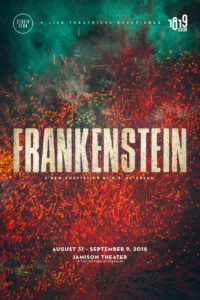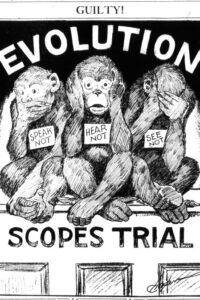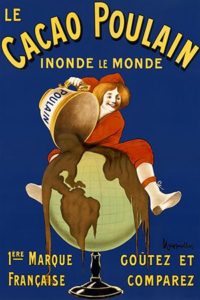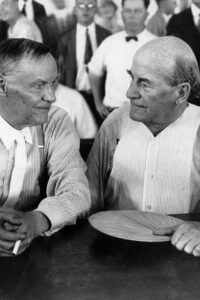One day when I was in high school I saw a truck pull into our driveway. The body of the truck was well used: coating of dirt, rust spots, some dings and dents. A guy got out and started ambling up the brick walkway to the front door. I recognized him as a fellow student though we did not run in the same circles at school. He was quiet, did not attract attention, and thus, kept a low profile. When the doorbell rang, I opened it and stepped out.
“You and the others at school have been calling me ‘farmer,’” he said, his voice clear and steady, his eyes a pinpoint focus on me.
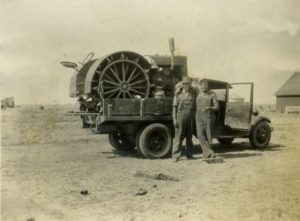
It was true. I had been calling him “farmer,” and not out of respect or kindness or even interest in what he and his family did for a living. I said it like the others said it, in a cruel, derogatory way. I wanted to be a part of the “in” crowd, and to be a part of the “in” crowd, I had to go along with a teenage boy’s fondness to encourage and use disparaging terms to demean another human being. To be cool in this “in” crowd one had to look down on others and coin insulting names to describe them, and then use those insults in such a fashion that would amuse the other members of this “in” crowd. For the truly sinister mind, one would craft scenarios for how the victim might live under a cloud of deprecating monikers, so in this case a lot of agricultural jokes were created. We never thought ourselves cruel. Those who indulge in such behavior never do.
“If I hear you call me ‘farmer’ again, I will beat the hell out of you.”
He did not wait for a reply. After making his proclamation, he returned to his truck and drove away.
He had come alone. What courage it took for him to come to my house and face me. He had also been wise to separate me from the pack. What a coward I was for being a part of this pack that had driven him to take such a bold step.
I went back inside and shut the door, and then heard Mom’s voice coming from the kitchen.
“Honey, was that one of your friend’s from school?”

I don’t remember my response to her question. I’m sure it was cagey if I answered at all. I was naked and ashamed and needed covering. I don’t know if the young man made the rounds to the homes of the rest of the “in” crowd facing each one mano a mano and shutting down their cowardly natures with a single threat. If he did, I don’t remember any of us talking about it. We would never admit our spinelessness to one another, a pack of cowards would never do such a thing. That’s why they run in packs. What I do know is that I stopped using the term.
But this did not stop the pack from finding new prey, and it wasn’t long before I fell out of favor with this group and became one of those victims.
I am missing half of my ring finger on my right hand, which was a source of embarrassment for me during my high school years. I also had warts on both my hands, and until a doctor finally removed them surgically, I kept my hands in my pockets most of the time, and would never dare to hold a girl’s hand on a date. Though I did try to play different sports in high school including basketball, I was a mediocre athlete. Dribbling is a key component to the game of basketball, and since I was right handed, it was not only a challenge to dribble a ball but also shoot it. Minimal skill and nine-and-one-half fingers equals minimal playing time and maximum bench warming.
One of the leaders of the “in” crowd who played the sport began calling me “Four-Finger” and “Nubby” for the clumsy way I handled the ball. One day after practice I caught him in the corner of the gym where no one could see us. I had learned the value of pack-separation. I pressed my left hand into his chest and held up my right hand before his startled face with all four and a half fingers spread out.
“You call me those names again, and I’ll show you what four fingers and a nub tastes like,” I said, curling my spread-out fingers into a fist.
And that was the end of that.
How many movies have we seen, how many young adult novels have we read about the perils and horrors of navigating through the tumultuous teenage years? These two seminal moments are brief and shameful scenes in my coming-of-age story: inflicting verbal abuse on one undeserving and experiencing the sting myself of similar verbal mistreatment. I wish I could say that the episode at my front door and the one in the gym were “Come to Jesus” opportunities and that I never said an unkind word again about anyone. But alas, that would not be the truth.
The nursery rhyme, “Sticks and stones may break my bones, but names will never harm me,” appeared in a children’s book in 1872 entitled, Tappy’s Chicks: and Other Links Between Nature and Human Nature, by Anne Jane Cupples. Cupples was a 19th century author of children’s books, a naturalist, and a pen pal with Charles Darwin no less, who encouraged her to record her observations of the emotions of dogs. Before Cupples used the rhyme, it appeared in The Christian Recorder in 1862, a publication of the African Methodist Episcopal Church that read, “Sticks and stones may break my bones, but words will never break me.” One has a children’s proverb feeling to it, a sentimental shrugging off of a schoolhouse insult. The other is more poignant for its African-American audience the majority of whom were suffering under slavery. Sticks and stones and numerous other instruments of brutality were used to physically break the enslaved, but this iteration was written to encourage them not to allow the hateful language used against them and detestable names used to describe them to “break” their spirit.
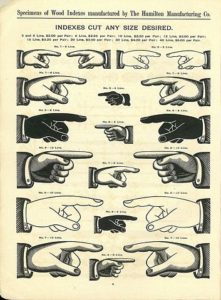
Growing up in the Arnold household, when two or more of the Arnold kids were caught in the act of name calling or worse, our common response was to point the finger of blame and say, “He or she started it.” Fortunately we had good parents who said, “Well, I’m stopping it.”
A bone can be broken and repaired. An abrasion to the skin can be patched. A wound can be inflicted and the blood flow stopped and the flesh stitched. We all like to hear our name called: the name given to us at birth; the name we build our reputation on; the name we use to sign any form; the name the check is made out to; the name we swear an oath upon. A name is to be hallowed. A name is to be cherished. A name, when spoken well of, should bring joy to the speaker and the bearer. When that name is damaged by a descriptive belittling term it offends and hurts. It brings pain not joy. None of us welcome such pain. Taming the tongue is a great challenge. The tongue can corrupt the whole person when not held in check or it can be an instrument of praise; it can inflict pain or be a healing balm for a damaged heart.

I recently performed in the play “Frankenstein,” by A.S. Peterson. At the end of the play when the Monster is about to die, the character I played asked the Monster to “…give us at least your name, that we may remember.” The Monster replied that he had only dreamed of a name, “…written upon a whitened stone.” The only names this Creature ever heard were opprobrious, and instead of receiving kind words and blessings spoken by others, he was showered with curses and physical blows. Such scorn contributed to him becoming a monster. But I wonder if those who behaved so cruelly toward the Creature were not the true monsters. It is folly to believe that we can continue to speak ill of others and not be poisoned by our own verbal bile. A small spark can set a forest ablaze, and so the tongue that utters praise instead of mocking could bring healing to a nation.
Cover Art: The Torment of Saint Anthony, by Michelangelo


